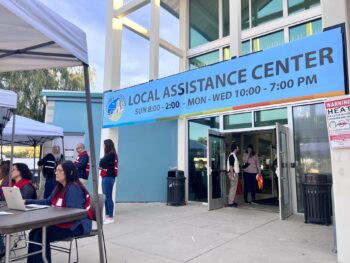There was a time, not too long ago, when sheriff’s deputies and police had just a few choices for handling people with mental illness, said Sheriff’s Capt. Gigi McCalla.
They could send them to jail or a County mental health facility. Or, maybe deputies would calm a situation and depart—but they could expect plenty of future calls involving the same person.
These days, County-funded Psychiatric Emergency Response Teams (PERT)—a specially trained officer or deputy and a licensed clinician who patrol together and handle calls—are helping people with mental illness get the lasting help they need, McCalla said.
“I am a fan,” said McCalla, a 28-year Sheriff’s Department veteran who saw PERT teams making a difference in the years she spent as lieutenant, and later captain, of the Lemon Grove Sheriff’s Station.
Her remarks came Tuesday as McCalla joined PERT staff to describe the unique program to about 100 members of law enforcement and professionals who monitor law enforcement. The audience from all over the U.S. and Canada was in San Diego to learn about best practices in policing and police oversight as part of the National Association for Civilian Oversight of Law Enforcement conference.
Since the first PERT unit went on patrol in 1996, the program has expanded to cover every jurisdiction in San Diego County. Regionwide, 24 PERT units handle about 15,000 calls a year, PERT Community Outreach Coordinator Marla Kingkade said Tuesday.
PERT is a nonprofit agency, funded through the County Health and Human Services Agency.
PERT units handle calls where mental illness may be a factor. The teams aim to compassionately defuse emergencies and make appropriate evaluations and referrals, with a related goal of preventing unnecessary incarcerations or hospitalizations, Kingkade said.
A network of programs and options for people with mental illness serves the region, and PERT units are uniquely positioned to connect people who come to the attention of law enforcement with the right help.
“This collaboration works,” McCalla said.
Deputies are frequently called to deal with situations involving mental illness, McCalla said. With PERT available to help, the calls can be resolved appropriately. And that’s very satisfying to deputies, who overwhelmingly join the profession driven by a desire to help the community, she said.
“Now we have so many places we can refer people to; if someone needs it, we can get that person or that family help.”





